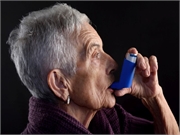TUESDAY, April 21, 2020 (HealthDay News) — Doctors are increasingly worried that people are mistaking stay-at-home orders to mean they should avoid emergency medical care — including for serious lung diseases.
People with chronic lung conditions, such as emphysema and moderate to severe asthma, are among those at higher risk of becoming seriously ill with COVID-19. And medical experts have been urging them to be vigilant about protecting themselves.
But now a new concern is surfacing: Are people being scared away from needed medical care?
“We’ve been noticing it anecdotally in our practice,” said Dr. Koushik Kasanagottu, an internal medicine resident at Johns Hopkins Bayview Medical Center in Baltimore.
He shared the example of one patient, a woman with emphysema, who on a recent morning woke with shortness of breath. She used her “rescue” inhaler medication — a standard way to manage a symptom exacerbation — but it didn’t help.
Still, fears over COVID-19 kept her from seeking emergency medical attention. Eventually, her sister did call 911. But by the time she reached the hospital her condition had worsened to the point that she needed a ventilator.
“The concern is definitely there,” said Dr. Albert Rizzo, chief medical officer of the American Lung Association. “Some people might think twice about going to the hospital, rely on their rescue medications, and try to tough it out.”
It is, of course, understandable that people would fear exposure to the coronavirus, or hesitate to add to the influx of patients into hospitals, Kasanagottu said. But delaying needed medical care is clearly dangerous — as the case of his patient shows.
Lung specialists are not the only ones worried that their patients’ care could suffer during the pandemic. Cardiologists believe that people are hesitating to act on symptoms of heart attack or stroke — possibly leading to fatal delays in care.
Last week, the American College of Cardiology’s CardioSmart.org website launched an education campaign urging the public not to “ignore” heart attack or stroke warning signs.
That came on the heels of a study looking at nine large U.S. hospitals. At each hospital, the number of patients being treated for a heart attack had dropped significantly since March 1. The reasons are not clear, but the researchers speculated that fear of the ER could be keeping people from calling 911.
For people with lung disease, the symptoms of an exacerbation — shortness of breath, coughing — can be similar to those of COVID-19, Kasanagottu said.
But either way, he added, they need attention. If the symptoms are not severe, patients can call their primary care doctor to talk about the next step, Kasanagottu said. But if breathing is difficult, or the symptoms are worsening, he said, call 911.
The “threshold” for calling 911, though, will differ from person to person, according to Rizzo. Someone who lives alone may need help sooner than someone who has a “trusted caregiver,” he said.
It’s also critical that people with lung disease, or any chronic medical condition, continue to receive routine care, Kasanagottu said. If that falls by the wayside, more people may suffer exacerbations and end up in the hospital — which everyone wants to avoid.
Telemedicine visits have become widely available for routine care, Kasanagottu said. He added, however, that it’s not enough. While many hospitals have been overrun, primary care clinics are also feeling the surge — fielding concerns about COVID-19 along with trying to keep up routine care for patients’ chronic conditions.
Meanwhile, some medical centers have pulled resources, including staff, from those outpatient clinics to help deal with the COVID-19 surge.
“Hospitals should be careful that they’re not too aggressive in diverting resources away from primary care clinics,” Kasanagottu said.
For now, Rizzo recommended that people with lung disease review their “action plan” with their doctor — that is, what they should do if their symptoms flare. They should also have a couple months’ worth of medication on hand, he said.
Some patients, according to Rizzo, have wondered whether their steroid medications — used to control airway inflammation — could put them at greater risk of COVID-19 by dampening their immune system.
But there is currently no evidence of that, and stopping preventive medications could allow the lung disease to worsen, Rizzo stressed.
“In general, people should maintain their normal medications to keep their disease stable,” he said.
More information
The American Lung Association has more on COVID-19.
Copyright © 2026 HealthDay. All rights reserved.

